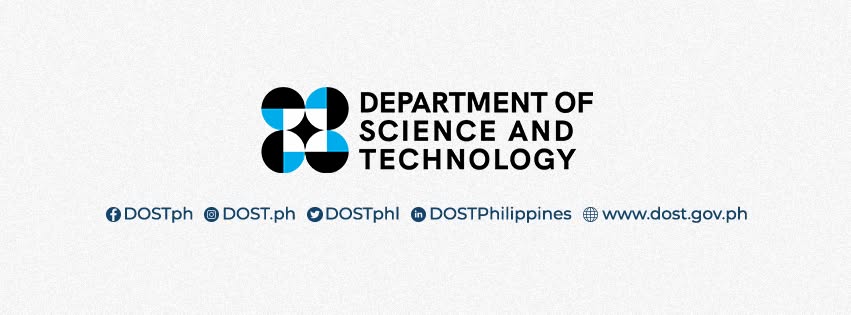
DOST Philippines. [Photograph]. Facebook. https://www.facebook.com/DOSTph/photos/this-is-the-official-facebook-page-of-the-department-of-science-and-technology-o/237456201896254/?_rdr
Currently, we live in a society where almost everything must be backed up by science—from the policies that govern nations to the technologies that shape our daily lives. Science has become the foundation of modern decision-making, offering evidence that guides innovation, health, education, and even social development.
However, for science to truly fulfill its role in advancing society, it must not remain confined to laboratories or academic journals. It needs to be communicated clearly and effectively to the public, bridging the gap between complex knowledge and everyday understanding. After all, the true purpose of science and research is to serve the public.
In the Philippines, the Department of Science and Technology (DOST) has consistently positioned itself as a driver of innovation, knowledge creation, and community transformation. As the government agency mandated to direct, lead, and coordinate the nation’s scientific, technological, and innovative initiatives, DOST works to ensure that these efforts deliver maximum economic and social benefits to the Filipino people. Serving as the country’s leading enabler and provider of science, technology, and innovation (STI) solutions, the department has also taken a forefront role in advancing science education and strengthening science communication.
Through Science and Technology
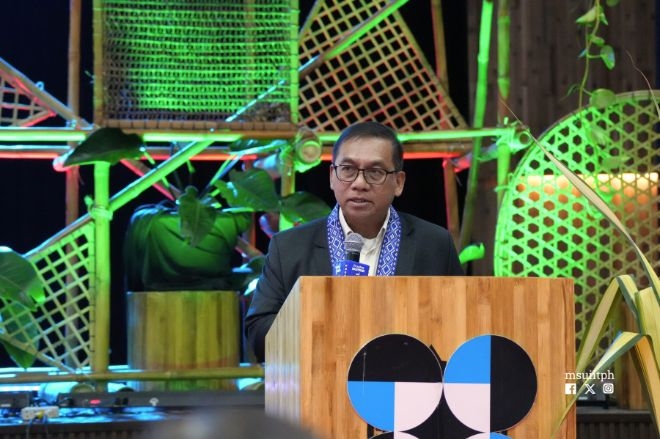
Buenafe, K. (2025). DOST Sec Solidum champions science, technology, and innovation [Photograph]. MSUIIT. https://msuiit.edu.ph/news/news-detail.php?id=2076
DOST Secretary Renato U. Solidum Jr. has emphasized the department’s work through four interrelated pillars that underpin science communication and application. Specifically, DOST programs must promote human well-being, foster wealth creation, reinforce wealth protection, and institutionalize sustainability.
The first pillar, promotion of human well-being, recognizes that the ultimate goal of scientific advancement is the improvement of human life. DOST’s initiatives in this area span healthcare innovation, nutrition research, disaster risk reduction, and environmental protection. Cited by Solidum, one example is the AI-Powered Weather Forecasting for a Resilient Philippines (AI-4RP). Launched in April 2024, AI-4RP uses high-resolution artificial intelligence (AI) models to improve weather forecasting accuracy, lead times, and runtime. This innovation directly supports disaster preparedness and community resilience by giving Filipinos earlier and more reliable warnings against typhoons, floods, and other climate-related hazards. Aside from these, DOST-Industrial Technology Development Institute (DOST-ITDI) invited the public to avail their livelihood training programs which help put up businesses using small equipment and investment.
The second pillar, fostering wealth creation, DOST acknowledges science and technology as drivers of economic growth. Hence, this area involves supporting innovation ecosystems, facilitating technology transfer, and nurturing entrepreneurial ventures that transform scientific discoveries into commercial opportunities. As mentioned by Regional Director Dr. Virginia Bilgera, DOST has also been supporting Micro, Small, and Medium Enterprises (MSMEs), particularly in adopting new technologies and enhancing their business capabilities. This includes capacity building for farmers and entrepreneurs, training, and mentorships in providing skills they need to improve product quality, increase efficiency, and explore potential export opportunities. Moreover, one of the flagship initiatives is the Small Enterprise Technology Upgrading Program (SETUP) which enables MSMEs to modernize operations and stay competitive in both local and global markets.
Under the third pillar, reinforcing wealth protection, DOST emphasizes safeguarding the nation’s resources and people. This covers not only disaster risk reduction, environmental management, and food security, but also strategic investments in human capital. Through its Scholarship Programs, DOST provides financial assistance and support to students pursuing careers in science, technology, engineering, and mathematics (STEM), ensuring a strong pipeline of future scientists and innovators. In addition, during the recent Innovation and Technology Transfer Summit (ITTS), DOST showcased various Filipino-developed innovations that contribute to wealth protection across different sectors. Among these were the C-Trike by Cagayan State University, a locally manufactured electric tricycle designed to reduce fuel costs and carbon emissions; the GenAmplify COVID-19 test kits developed by UP Manila, which were deployed nationwide during the pandemic; and BIo-N and Project SARAI from UPLB, which advance climate-smart and cost-effective farming practices.
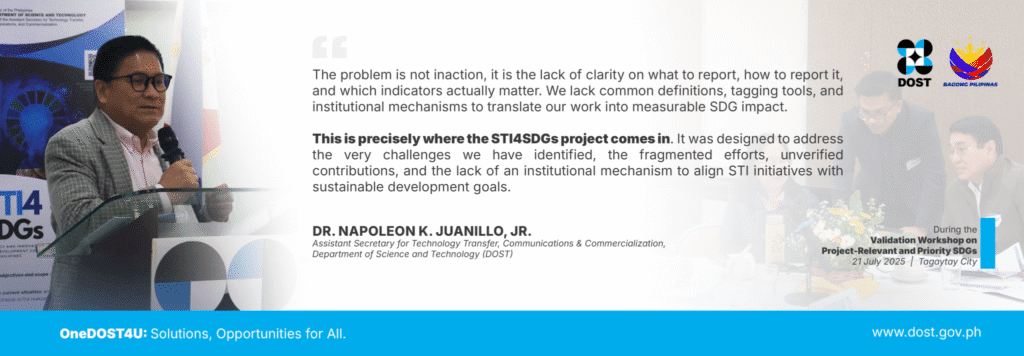
STI4SDGs. [Photograph]. https://sti4sdg.dost.gov.ph/
Lastly, under the fourth pillar, institutionalizing sustainability, DOST highlights the importance of building long-term systems that ensure resilience and inclusive growth. One key initiative presented during the DOST-Technology Transfer, Communications, and Commercialization Zonal Conference was the Science, Technology, and Innovation for Sustainable Development Goals (STI4SDGs) program, which develops SDG-specific roadmaps covering the entire innovation lifecycle while addressing pressing national challenges. Furthermore, through its Smart and Sustainable Cities and Communities initiative, DOST promotes the integration of advanced technologies in urban planning to create livable, efficient, and disaster-resilient communities.
Together, these four pillars form a comprehensive framework that aligns scientific innovation with national development. By advancing human well-being, driving economic growth, protecting resources, and promoting sustainability in long-term systems, DOST demonstrates that through science and technology, we can build a more resilient, inclusive, and progressive Philippines.
With Science and Technology
DOST’s efforts go beyond laboratories and policy spaces. Aside from research and innovation, they directly touch the lives of students, young leaders, and marginalized communities. Through its scholarship programs, the department has empowered countless aspiring scientists, engineers, and innovators to pursue their dreams. DOST-Science Education Institute (DOST-SEI) has been consistently opening its undergraduate scholarship programs, namely RA 7687 and Merit to Senior High School students who wish to pursue courses in Science and Technology. RA 7686, also known as the Science and Technology Scholarship Act of 1994, provides scholarships to talented and deserving students whose families’ socio-economic status do not exceed the set cut-off values of certain indicators. Meanwhile, the DOST-SEI Merit Scholarship Program is given to students with high aptitude in science and mathematics. These scholarship programs not only empower students to continue their education but also serve as investments in the country’s scientific and technological future.
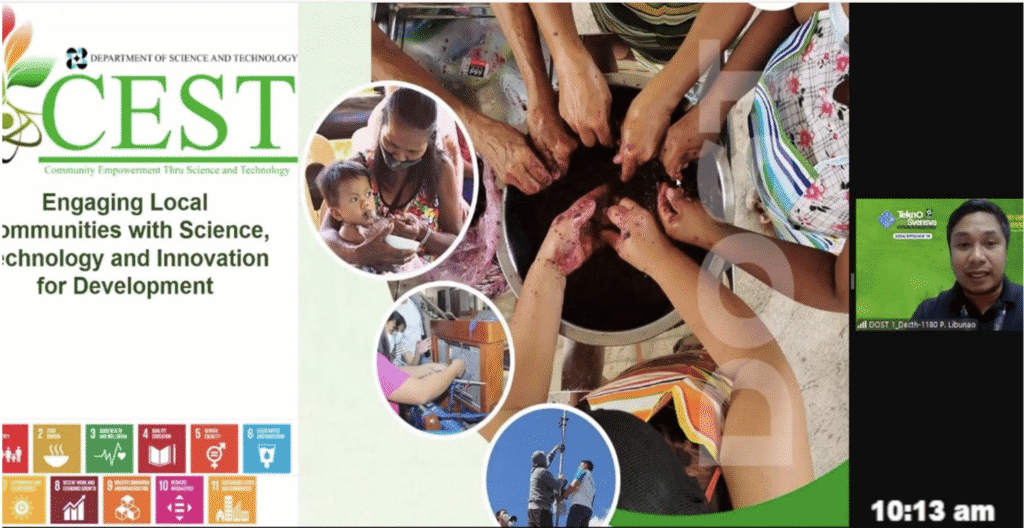
Casimiro, C (2024). DOST 1 Builds Stronger Communities With CEST Program [Photograph]. DOST Region 1. https://region1.dost.gov.ph/news/dost-1-builds-stronger-communities-with-cest-program/
At the community level, the Community Empowerment thru Science and Technology (CEST) program illustrates how research and innovation can translate into concrete opportunities for development. CEST program aims to provide livelihood and alleviate poverty in remote communities by providing technology-based livelihood projects and facilitating knowledge transfer in critical areas such as education, health and nutrition, water and sanitation, disaster risk reduction, and industry development. Under this program, the Water Purification Project helped about 300 households in Dumaran, Palawan in accessing purified water. Moreover, boats were also distributed to fishermen in Northern Palawan to aid the recovery of the fishing livelihood due to Typhoon Odette.
Beyond community programs, DOST has also made major contributions to advancing Philippine science and innovation. With the country’s recurring challenges in flood management, Project NOAH (Nationwide Operational Assessment of Hazards) has been instrumental since 2012 in providing tools and information to reduce disaster risks and protect communities. Although government funding constraints led to its discontinuation under DOST in 2017, the project was fortunately adopted by the UP Resilience Institute, ensuring that its life-saving research, hazard maps, and disaster preparedness tools continue to benefit Filipinos.
Moreover, the Balik Scientist Program helped in strengthening the country’s research and innovation capacity, with more than 120 Filipino scientists returning since 2022 to share their expertise in advancing scientific, agro-industrial, and economic development. Through government grants and aid, these experts are supported in establishing laboratories, acquiring equipment, and sustaining research initiatives. Their contributions have led to impactful innovations, such as the development of a mobile African swine fever (ASF) testing facility, which is now progressing toward a potential vaccine.
Towards the future, Solidum has also mentioned an initiative called Pagtanaw 2050 which aims to institutionalize a future-ready mindset among leaders, policymakers, researchers, local executives, civil society groups, and industry stakeholders. By equipping them with the tools to anticipate, navigate, and shape the future of science, technology, and innovation, DOST proactively ensures that the Philippines is ready to respond to challenges.
Looking to promote science, technology and innovation past the norms, the DOST also initiated the Science Beyond Borders Campaign last 2024. This campaign intends to bring science, technology and innovation closer to the people by going beyond the usual regardless of distance, industry, nature of business, profession and even personal and professional background. The campaign is composed of the following components;
- Delving into the unusual: Offering programs and science-based initiatives to challenge norms beyond borders;
- Tapping into the unknown: Recognizing trends and emerging issues and leveraging science-based initiatives related to them;
- Building science culture: Communicating science to uncover Filipino ingenuity; and
- Enjoining the science community to Provide Solutions and Opportunities as one Science Community
We see that with science and technology, individuals—and eventually the country—will thrive in building resilience, fostering innovation, and pursuing sustainable progress that benefits both present and future generations.
For Science and Technology
DOST continues to advance its mission through partnerships and active participation in outreach initiatives. One of the more recent demonstrations of DOST’s science communication efforts was its role as a key partner in the Safe Plate PH Online Workshop. This youth-led initiative carried the theme “Protecting Filipino Families One Meal at a Time” and focused on raising awareness about food safety, nutrition, and the science behind everyday choices Filipinos make at the dining table.
Through its participation, DOST highlighted the idea that science is not confined to laboratories or classrooms but is present in ordinary practices such as food preparation and dietary habits. By working with Safe Plate PH organizers, DOST provided technical expertise, resource speaker, and communication support that grounded discussions in evidence-based science while making them understandable and practical for households.
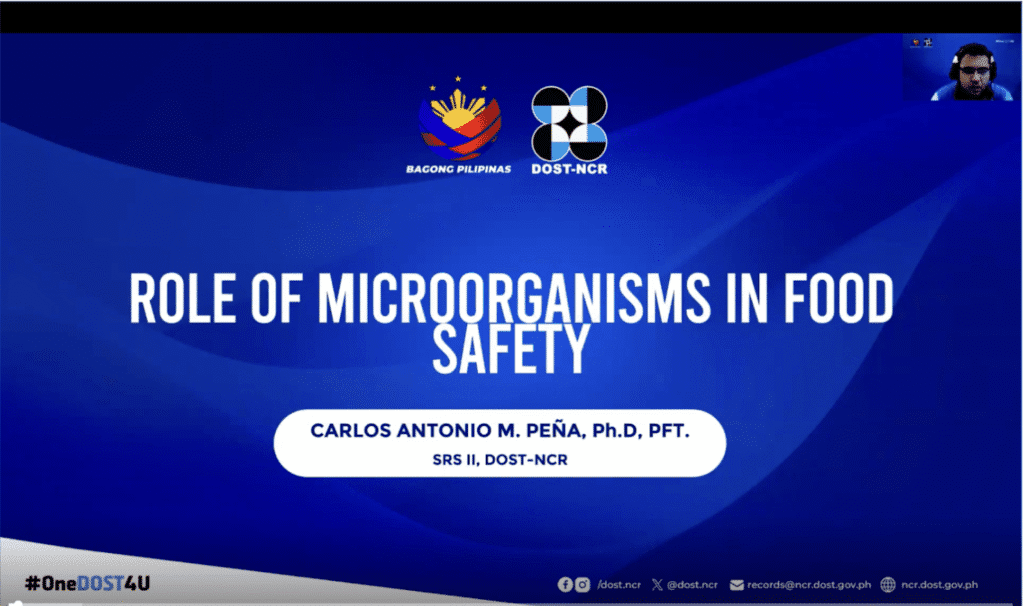
Peña, C (2025). Role of Microorganisms in Food Safety [Photograph]. DOST NCR. Screenshot from the Online Workshop. https://www.youtube.com/watch?v=ddR-2aQRZPs&t=5135s
The workshop tackled issues on food safety, youth advocacy, street food dining, and food microbiology. Under food microbiology, Dr. Carlos Peña, a science research specialist in DOST-NCR, shared his technical expertise on food microbiology, common foodborne pathogens, and Philippines regulatory bodies in setting safety standards and guidelines.
By engaging with advocates and youth leaders, DOST fosters inclusive science communication that empowers the public to become more informed and eventually to champion safe and sustainable practices. This initiative also reflects DOST’s broader commitment to bringing science closer to communities by creating meaningful spaces for dialogue and learning.
After all, efforts like Safe Plate PH align with what DOST and the Department of Education (DepEd) have pledged: to strengthen science education in public schools and nurture a generation that values scientific thinking. As Secretary Solidum emphasizes, the success of science, technology, and innovation begins with our educational system—most especially with the youth.
For science and technology, DOST demonstrates its commitment to science education and communication by making knowledge accessible, relevant, and impactful in the lives of Filipinos.
Through, for, and with science and technology, whatever path one chooses to pursue becomes a contribution to nation-building and sustainable development. We hope that young leaders, scientists, and DOST efforts will continue to inspire future generations to embrace science as a one of the driving forces for innovation and progress.



